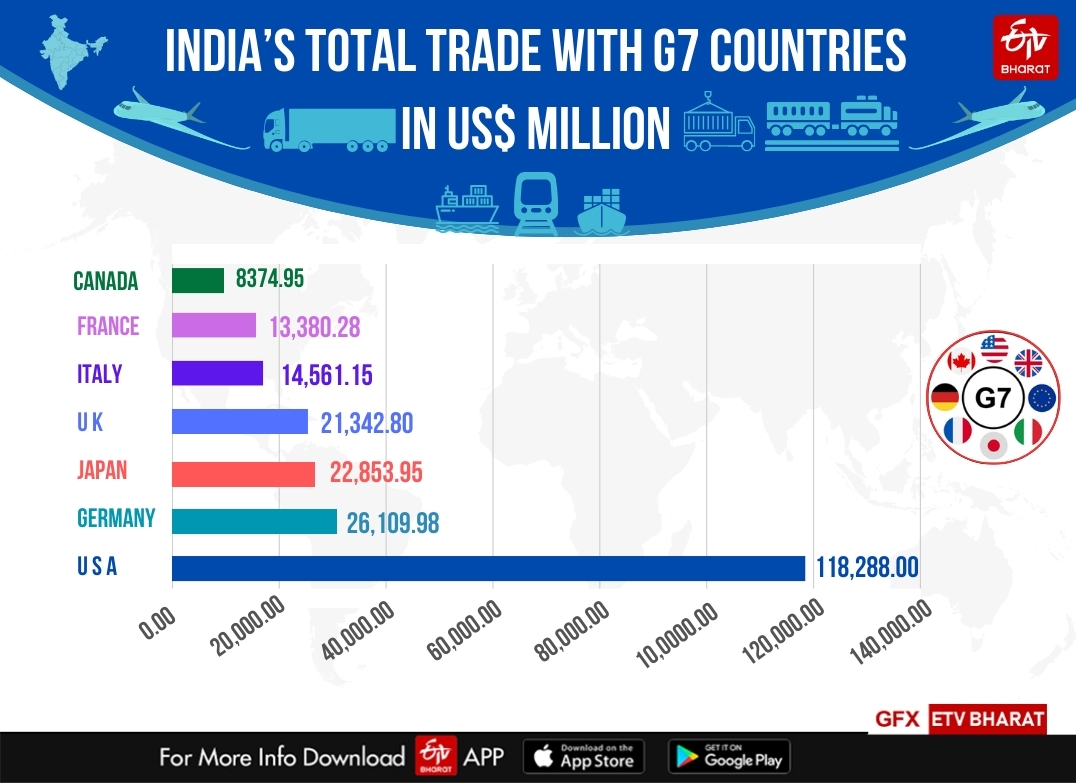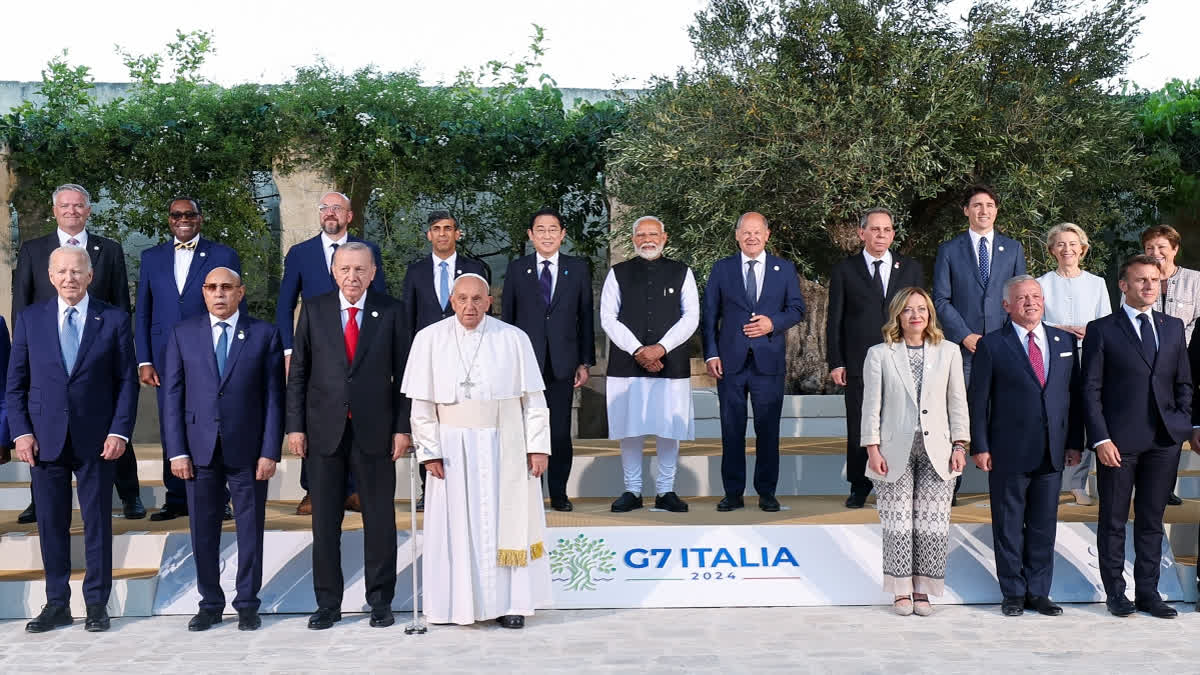Prime Minister Narendra Modi’s third term commenced with quick decisions on domestic and international fronts. By inviting leaders from South Asian countries, he indicated that there would be continuity in his proactive foreign policy. Within a few days after swearing-in, PM Modi travelled to Apulia in Italy to participate in the G7 meeting, which was his first international visit after being elected for a third term. India's participation at the G7 was all about engaging the developed Western countries, reiterating the rise of India as an important economic power and articulating the concerns of the global south.
G7 and India
The G7 summit in Italy had a special significance as it was also the 50th anniversary of the grouping. The G7 was conceived during the Cold War, and consequently, the major liberal democratic economies of that time were included as members. Even today, the composition of the G7 has remained the same, with the United States, Canada, France, Germany, Italy, Japan, and the United Kingdom as members.

While India is one of the top five economies in the world, it is not a member of the G7, as it is still considered a developing country. In recent years, India’s economy has registered impressive growth. It is the world’s largest democracy and is critical to maintaining stability in the multipolar world order. Consequently, India is often invited to the G7 as an 'Outreach Country' even though it is not a full member. Thus far, India has participated in 11 G7 Summits, and Prime Minister Modi has participated in about five consecutive meetings. India has growing economic and trade relations with many G7 countries, so it is vital that Delhi interacts with these countries at bilateral and multilateral platforms.
On the sidelines of the G7 summit, Prime Minister Modi had a series of fruitful interactions with many world leaders, such as US President Joe Biden, German Chancellor Olaf Scholz and French President Emmanuel Macron. The Indian and Italian prime ministers called for improved bilateral economic relations in the domains of 'clean energy, manufacturing, space, and telecom.'
With Japan’s Prime Minister Fumio Kishida, PM Modi exchanged views on a Special Strategic Global Partnership. They also discussed projects such as the Mumbai-Ahmedabad high-speed railway project. Modi also interacted with British Prime Minister Rishi Sunak. It should be noted that India and the UK are in an advanced stage of negotiations on a bilateral free trade agreement.
For the United Kingdom, after it withdrew from the European Union, enhanced economic engagement with emerging economies such as India has assumed significant importance. Both prime ministers took stock of the free trade agreement, which is in an advanced stage of negotiations. Prime Minister Modi’s interactions with Pope Francis caught the attention of many. PM Modi and Pope Francis hugged each other, and they had a brief light-hearted conversation. The Indian prime minister invited Pope Francis to visit India.
The Prime Minister utilised the G7 platform to showcase the strength of Indian democracy and the extraordinary arrangements which were made to successfully complete the recent elections in the country. Some of the G7 countries, such as France, the UK, and the US, are heading for elections this year. The US President and UK Prime Minister are in their first term and are facing severe anti-incumbency. On the other hand, the Indian Prime Minister was elected to office for a third term. At the Summit, Prime Minister Modi noted that the results of the Indian elections constituted the "victory of the entire democratic world."
China and Conflicts
While the G7 Leaders' Communiqué expressed support for the India-Middle East-Europe Economic Corridor, it was sharply critical of China's role in global politics. There were over two dozen references to China in the Communiqué. The Communiqué criticised China's aggressive tactics in the South China Sea and Taiwan.
The Communiqué argued that China's economic/ trade policies are contributing to 'market distortions' resulting in the undermining of 'industries, and economic resilience and security' of the G7 countries. In response to the China challenge, the G7 leaders noted that they would “invest in building our and their respective industrial capacities, promote diversified and resilient supply chains, and reduce critical dependencies and vulnerabilities.”
The G7 leaders also expressed their disappointment with China's alleged support to Russia in its war against Ukraine. For Ukraine, the G7 leaders promised USD 50 billion in assistance and vowed to tighten sanctions against Russia. During his interactions with Ukrainian President Volodymyr Zelensky at the Summit, the Indian Prime Minister stressed the importance of peaceful resolution and added, "India would continue to do everything within its means to support a peaceful solution." Indian officials also participated in the Peace Summit, which was organised in Switzerland to discuss the Russia-Ukraine conflict on June 16-17.
Next Steps
There was considerable discussion on migration from the developing world to Europe during the recent G7 summit. However, it is imperative that developed countries pay closer attention to the economic and technological needs of the developing world. India continued its advocacy for the Global South, including other African countries. During his interactions with the G7 leaders, Prime Minister Modi called on the powerful economies to ensure that the latest technologies, such as artificial intelligence, are "transparent, fair, secure, accessible, and responsible" and stressed the importance of converting "the monopoly of technology into mass usage."
Over the past few years, there was a discussion that the membership of the G-7 should be expanded, which is indicative of the power shift that is taking place. The established powers want to maintain their hold on global institutions as they did immediately after the Cold War. However, there has been a significant shift in the global power relations.
The global economy has witnessed significant changes in the past few decades. Countries such as India have emerged as major economies. Unlike China, India is a vibrant democracy and an open society. Therefore, keeping India out of the formal membership of the grouping does not make much sense. There were proposals to convert the G7 to G10 by including countries such as Australia, India, and South Korea.
In fact, former US President Donald Trump went a step further and proposed G-11 by including Russia as well. The persistent discussions on the need to expand the membership of the G-7 is a consequence of the rapid rise of countries such as India. Italian Prime Minister Giorgia Meloni noted that the G7 is “not a fortress closed in itself…[but]..an offer of values that we open to the world.” Perhaps it is time for G7 to walk the talk and make India a full member of the grouping and not just an outreach member.
(The views expressed by the author are personal)



